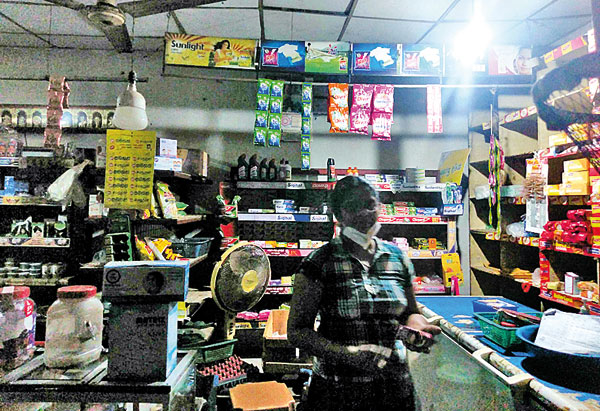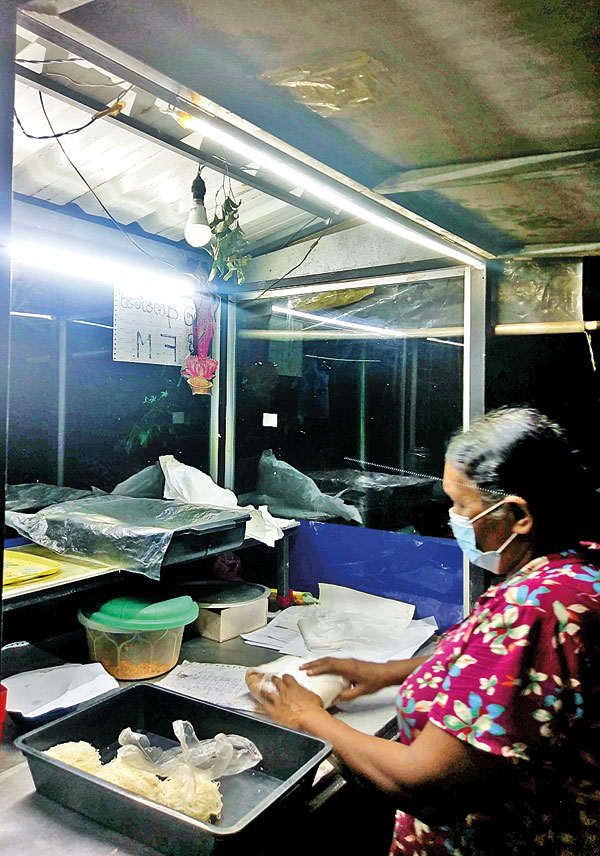News
Power struggle frustrates homes and business
Rolling power cuts at various times of the day and night, ranging from an hour to 45 minutes, adding up to a total of seven hours a day, will bring most economic activity to a halt, while households will struggle to cope.
Despite strong assurances by the Public Utilities Commission of Sri Lanka (PUCSL) that there will be no power cuts for three months, the regulator announced a schedule of interruptions on Friday.
Irregular power cuts and power failures had so far hampered the activity of businesses trying to recover from the coronavirus pandemic.

Badly hit: Small eateries and other businesses. Pix by Indika Handuwala
The state power supplier has said there is a shortage of 490 megawatts to the national grid because plants including Sojitz-Kelanitissa, Mathugama, and Thulhiriya are idling from a lack of fuel. And the regulator has approved purchases of 300Mw of power from private sources.
An employee of a motorbike garage, Amal Sampath said unexpected power cuts have ruined his business over the past few months.
He said that the spray paint machine, compressor, and the electric water pump used to service motorbikes, run on electricity.
“Whenever there is a power cut we are unable to work. There were days where we lost good customers because we could not repair motorbikes within a day,” he said.
Mr Sampath who is a breadwinner of a family of four said that his family depends on the Rs 1,000 to 2,000 daily earnings.
Meanwhile, bakery and eatery owners said they will incur extra costs. And blackouts force them to shut their outlets, on some days.
A bakery owner, T. Naathan, told the Sunday Times that he had to store the diesel needed for the small power generator at his bakery.
 When the power is cut, he is unable to operate the bread slicing machines and electric ovens.
When the power is cut, he is unable to operate the bread slicing machines and electric ovens.
“Now I have to even spend extra on diesel and also bear the cost of the ingredients,’’ he said.
M.A Sunitha, an owner of a night eatery in Gampaha, said that she does not have a power generator. So the only choices are to either shut down the eatery or to use rechargeable flashlights and get by. Nighttime blackouts mean fewer diners.
Ms Sunitha said that her son employs five people at the eatery and they have to be paid despite the disruption.
An owner of a communications outlet in Wellampitiya, Manoj Gamage said that typesetting and printing work is held up when two power cuts happen in the same day.
“If we face a blackout while we are printing, our paper gets wasted. Then we have to reprint from the start, but there is no way for us to claim for the paper wastage,” he said.
The power cuts also come in the midst of the G.C.E (A/L) examinations.
The PUCSL told the Sunday Times that even though it had tried its best to avoid scheduled power cuts, there is uncertainty over managing the supply when there is a shortage of fuel and also breakdowns at power plants.
Chaiman Janaka Ratnayake told the Sunday Times that the public should reduce electricity use during peak hours so the Ceylon Electricity Board would be able to supply power for more days without interruptions.
“If we have ample fuel and coal and if power plants would not break down, we can manage the situation until the rains, and manage with hydropower. But, currently, the water levels of reservoirs under the Ceylon Electricity Board are dropping,” he said.
Because of this, the CEB has to focus more on diesel, furnace oil, and coal.
Mr Ratnayake said there are plans to disconnect electricity users who have generators from the national grid and allow them to manage their requirement and add their excess power to the grid.
The PUCSL announced one hour island-wide power cuts from Friday afternoon.
Power cuts were scheduled from 2:30pm to 6:30 pm, while 45 minute power cuts will be from 6:30pm to 10:30pm.
The Ceylon Electricity Board Engineers’ Union (CEBEU) said hydropower generation has to be controlled until the time when the rains fill the reservoirs. The CEB should maintain a backup power supply to supplement plant breakdowns.
The union said also the availability of fuel dictates power generation in a situation where reservoir water levels are falling.
Union head, Anil Ranjith said water in Irrigation Department reservoirs are for drinking and agricultural purposes. As a result, there is greater dependence on furnace oil and diesel for which there is no hard currency for imports.
He also lamented the lack of backups in the country.
“Most countries maintain power reserves. Solar and wind power generation can only be done during daytime. If there are storage systems, that too would be a solution,’’ he said.
The best way to say that you found the home of your dreams is by finding it on Hitad.lk. We have listings for apartments for sale or rent in Sri Lanka, no matter what locale you're looking for! Whether you live in Colombo, Galle, Kandy, Matara, Jaffna and more - we've got them all!

